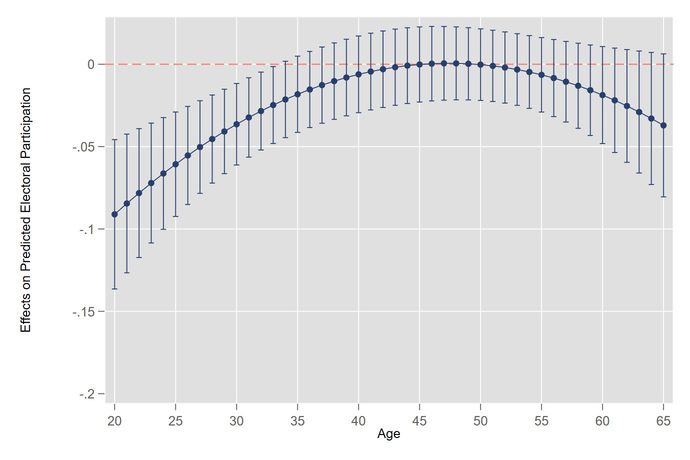Dr Leo Azzollini, INET Oxford’s Postdoctoral Research Officer, sets out his new research showing young people’s double disadvantage when it comes to unemployment and electoral participation.
Who will win the next UK General Election? With January 2025, the date by which the election must be held, just 18 months away, the public sphere is again focusing on this question. But before we can forecast who will live in 10 Downing Street, we need to take a step back and ask another question: who votes? Or more importantly, who does not?
It is widely known that young people tend to vote less than older people: this is well-established in most democratic countries, and the UK is no exception to this pattern. But because of this life-cycle effect, young people have a key political disadvantage: their electoral weight is less than it should be, influencing both election results and policymaking.
While less likely to vote, young people are, instead, more likely to experience spells of unemployment at the beginning of their careers. This is similarly problematic, because unemployment experiences decrease the probability of voting - even after an individual gets another job.
In my recent study published in the British Journal of Sociology, I show that these two effects are combined in a double disadvantage. Data from the British Household Panel Study and Understanding Society longitudinal data (1991-2020), revealed that periods of unemployment hit individuals much harder when they are younger, but have next to no effect after the age of 35, as depicted in the Figure below.

This double disadvantage is linked to the impressionable years window: the period when your worldview, your outlook on society, politics, and more generally life was shaped. This most likely happens sometime between 15 and 30. In this critical time window, your outlook is profoundly shaped by your life experiences, and then becomes largely stable afterwards.
Voting follows this pattern closely. So, people who have taken part in a few elections are likely to continuing to vote, even if they experience unemployment. But a life-changing experience during the impressionable years powerfully decreases electoral participation.
This is strongly problematic. If socio-economic hardships lead to lower political engagement, there is a concrete risk of a vicious circle arising between social vulnerability and political marginality.

"If socio-economic hardships lead to lower political engagement, there is a concrete risk of a vicious circle arising between social vulnerability and political marginality." Dr Leo Azzollini
Significant political impact
Will this have a significant impact? If you look at the numbers, there are around 13 million people in the UK between the ages of 20 and 34 (UK Population Pyramid, 2023), and around 25% of them have experienced unemployment at least once before 2020 – that is a group of over 300,000 potential voters. In the wake of the labour market disruptions of Covid-19, it is very likely this group has further increased.
To consider their potential influence, let us examine the 2017 UK General elections: a 2% shift (around 700 thousand votes) would have tilted (or reinforced) the outcome. Similarly, in the US Elections in 2016 and 2020, less than 1% margins in critical states decided who lived in the White House.
So, we very much should care. This doubly disadvantaged group could be critical to shape the future of the UK – whether they vote or not.

"This doubly disadvantaged group could be critical to shape the future of the UK – whether they vote or not." Dr Leo Azzollini








